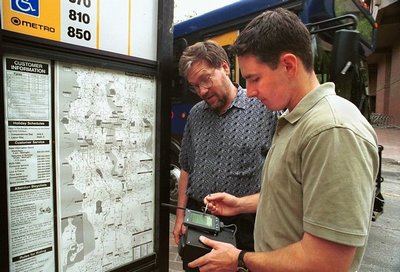March 12, 2004
UW developing AI caretakers that could assist the elderly and disabled
A hand-held device that can precisely pinpoint a person’s location, track the user’s movements and give directions could mean freedom for many seniors whose navigational abilities are failing.
And it could bring greater peace of mind to family members overwhelmed by the demands of caring for an elderly parent.
University of Washington graduate student Don Patterson will be on Capitol Hill in Washinton, D.C., Tuesday to demonstrate such a device, dubbed “Opportunity Knocks,” as part of a technology demo sponsored by the Center for Aging Services Technologies. He will be among 15 researchers from around the country showing inventions and products that can address the healthcare needs of 76 million baby boomers as they approach old age.
Opportunity Knocks is the latest version of a navigational device being developed under the Assisted Cognition program in the UW’s Department of Computer Science & Engineering. It consists of a next-generation cellular telephone that captures the user’s location via a Global Positioning System beacon, then sends that information via a high-speed phone network to a computer server. The program on the server uses the location information, along with other variables such as mode of transportation, real-time bus location information (available in Seattle) and predicted destination, to decide whether the user is on course.
If a user gets off course, or seems about to miss an opportunity – like not getting off at the right bus stop or not walking toward his or her parked car – the telephone is prompted to make a door-knocking sound to get the person’s attention and suggest a course of action.
“This is an active, not a passive, device, and is much different than something like MapQuest,” Patterson said. “Users don’t specify a location and use just one click to select a destination, yet the phone can use real-time information to get them where they want to go.”
Opportunity Knocks is one of a number of projects being undertaken by the UW’s Assisted Cognition group, which is chipping away at the complex issues involved in creating an AI caretaker. The stakes, according to the team, are high.
In the last 50 years, Alzheimer’s disease has grown from relative obscurity to become a defining characteristic of industrialized society. In 1950, at the most 200,000 people in the United States suffered from the ailment. The total stands at 4 million today, according to the National Institute on Aging. By 2050, barring a cure, the number of U.S. sufferers is expected to reach 15 million, out of a total of 80 million worldwide.
As the need for assistance increases, artificial intelligence caretakers could give patients more independence, save family members from emotional burnout and free adult caregivers to return to the workforce.
While the computing sophistication needed to build a comprehensive artificial intelligence caretaker is probably 20 to 30 years away, the time to begin is now, says Associate Professor Henry Kautz, leader of the Assisted Cognition Project.
“The question is whether we can build systems that are smart enough, flexible enough and reliable enough to replace human caregivers,” Kautz said. “I’m confident that we can, but it will be an incremental process.”
###
For more information, contact Kautz at (206) 543-1896 or kautz@cs.washington.edu, or Patterson at djp3@cs.washington.edu. More information on the Assisted Cognition project can be found on the Web at http://www.cs.washington.edu/assistcog/
A high-resolution color image of Patterson and Kautz programming a prototype of the Activity Compass, a predecessor of Opportunity Knocks, is also on the Web at http://www.washington.edu/newsroom/news/images/compass.jpg. Required photo credit: Mary Levin, University of Washington.



